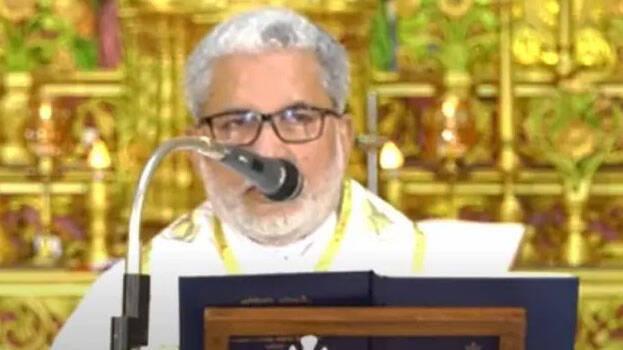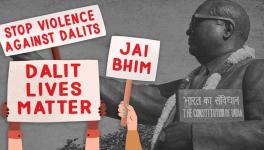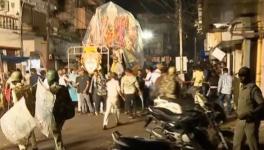Narcotic Jihad’ row Helps BJP’s Bid to Polarise Kerala

Image Courtesy: Kerala Kaumudi
More than two weeks after bishop Mar Joseph Kallarangatt of the Palai diocese of the Marth Mariam Pilgrim Church, in Kuravilangad, Kottayam district, warned his laity of “love jihad” and “narcotic jihad” against non-Muslims in the Kerala, chief minister (CM) Pinarayi Vijayan severely criticised the comments.
At a press conference held on September 22, Vijayan quoted government data to dismiss such claims and said that such statements are being used by vested interests to communally polarise society. The state government would take stern action against anyone propagating such false theories and inflammatory rhetoric, he added.
Citing the latest crime statistics to debunk the allegations, Vijayan said that out of the 5,422 accused in 4,941 cases registered under the Narcotics Drugs and Psychotropic Substances Act in Kerala last year, 49.80% were Hindus, 34.47% Muslims and 15.73% Christians. There were no complaints of forced drug abuse or usage of narcotic substances for carrying out religious conversions and the statistics showed that drug peddlers and users do not belong to any particular religious community, he pointed out.
Quoting the number of Keralites who had joined the Islamic State (IS), the CM said that most of them had gone abroad for jobs or other purposes. Of the 28 people from Kerala who had joined the IS, only five were converted—a Christian couple, a Hindu woman and her Christian husband and a Hindu youth, he added. There was also no evidence of forced conversions in the state, he asserted. Earlier this month, calling the Bishop’s remarks unfortunate, Vijayan had said that people in responsible positions should exercise restraint.
‘Narcotic Jihad’ Controversy
Bishop Kallarangatt’s address at the Syro-Malabar Church on September 8 sparked the ongoing controversy. Reading from a prepared speech, the bishop said that “jihadis” are trapping women of Christian and other non-Muslims faiths through love or by using narcotic drugs and forcibly converted them.
Kallarangatt also alleged that “hard-core jihadis” lure and trap non-Muslims using an organised racket of ice cream parlours, juice shops, bakeries and restaurants where drugs are sold. He also termed halal food as ‘trade gimmicks’. The written speech was later published by the church-run Deepika daily.
More than 200 workers from various radical Muslim organisations under the banner of Muslim Aikya Vedi marched to the bishop’s house two days later in protest, which was followed by counter-marches by Christian organisations and a section of politicians supporting Kallarangatt. The Kerala unit of the Bharatiya Janata Party (BJP) also supported the bishop with its general secretary George Kurian requesting Union home minister Amit Shah to intervene in the matter and provide security to him and the Christian community. BJP National Executive member PK Krishna Das and state vice-president AN Radhakrishnan accused the Communist Party of India (Marxist) and the Congress of “whitewashing the activities of extremist forces in the state’.
Things took a turn for the worse when it came to light the Thamarassery Diocese of the Syro-Malabar Church had published a catechism textbook titled Truth and Realities in 33 Questions and Answers, which contained several defamatory and derogatory statements against Muslims. However, following a meeting of Muslim community leaders with bishop Remigiose Inchananiyil and his clergymen from the diocese, the bishop announced the withdrawal of the objectionable contents in the textbook and expressed regret at hurting the sentiments of Muslims.
Syro-Malabar Church’s increasing alignment with BJP
Allegations of ‘love jihad’, or organised efforts by Muslim outfits to convert women from other religions to Islam by getting Muslim men to lure them into love, were first raised around 2009 in Karnataka and Kerala by communal organisations like the Hindu Janajagruti Samiti and Shri Ram Sena. The controversy was soon fanned by the Kerala Catholic Bishops Council and a few Malayalam media outfits.
Despite the Kerala Police and the National Investigation Agency (NIA) concluding that there is no evidence of ‘love jihad’, the bogey has been exported and weaponised in other parts of the country by the Sangh Parivar even as the Centre has also denied any such incidents in Parliament.
The Syro-Malabar Church, the world’s second-largest Eastern Catholic Church, which had traditionally sided with the Congress and the United Democratic Front (UDF) in the state, has increasingly aligned with the BJP in the last couple of years by making allegations of ‘love jihad’. In 2020, the synod of the church filed a complaint with the National Commission for Minorities claiming that half the IS recruits from the state were converted Christian youths and comparing ‘love jihad’ to the execution of Christian captives in Nigeria by the IS.
In the run-up to the state Assembly elections this year, a senior clergy raised the issue again in a meeting with Prime Minister Narendra Modi that was arranged by the state BJP leadership. Church leaders from two other denominations also met with a senior Rashtriya Swayamsevak Sangh (RSS) leader in March. These moves have been criticised by the reformist sections within the church.
Sections of the Christian clergy in Kerala, particularly from the Syro-Malabar Church, have drawn closer to the BJP even though the Sangh Parivar outfits have attached churches across the country. The development has also been forced by the weakening of the Congress in the state and the increasing disarray within the party.
With the church facing a dwindling laity as a result of migration of Christians to foreign countries and many Christians in the state involved in cultivation of plantation crops facing stagnating or deteriorating economic conditions post-trade liberalisation, communal hatred has found a fertile breeding ground. Some have also pointed out that hate-mongering is being used to cover the fault lines within the church as a result of internal feuds with the reformist sections.
The result has been a rise in anti-Muslim rhetoric, especially on social media. Several Christian social media handles posted vicious propaganda against Palestinians during the recent Israeli aggression in Gaza and communal hatred has proliferated recently in discussions on platforms such as Clubhouse. Polarising statements were also made regarding the issue of division of minority scholarships in the state.
Actions of some communal and fundamentalist Muslim organisations in the state, like the attack on college lecturer TJ Joseph in 2010, the endorsement of Turkish President Recep Tayyip Erdoğan’s conversion of the historic Hagia Sophia in Turkey into a mosque and hailing of the Taliban’s capture of power in Afghanistan, have only exacerbated tensions. The BJP, which has realised that it needs to have the backing of sections of, at least, one minority community in Kerala to make headway in the state given its demographic realities, has welcomed and encouraged these developments.
Reason for hope
Apart from the government and large sections of the civil society, many Christian clergies from both Catholic and non-Catholic denominations have come out against the preaching of hatred even as the Syro-Malabar Church has officially thrown its weight behind Kallarangatt. Four nuns who had earlier protested rape-accused bishop Franco Mulakkal walked out in protest against the anti-Muslim remarks made by a priest during a prayer service inside another chapel in Kuravilangad.
A bishop of the Orthodox Church called for church leaders to be vigilant against the “politics of hate and fear” and to not fall into the trap set by “fascist and communal elements”, a statement which was echoed by diocese metropolitan Yuhanon Mor Meletius. A bishop of the Jacobite Church condemned the usage of the altar for the propagation of politics of hatred while another church in south India advocated the cause of secularism. Major archbishop Cardinal Baselios Cleemis of the Syro-Malankara Catholic Church called for peace and communal harmony, adding that “narcotics must be viewed as narcotics alone” after a joint meeting of religious leaders from different communities that he had called.
The public statements from these church leaders and efforts to mend differences and encourage communal harmony have come as a relief. Kerala’s secular fabric has so far been able to withstand attempts of communal polarisation by both majoritarian and minority communal organisations. Only concerted efforts by the civil society, secular-minded religious organisations and political parties can ensure that the state’s unity remains intact.
Get the latest reports & analysis with people's perspective on Protests, movements & deep analytical videos, discussions of the current affairs in your Telegram app. Subscribe to NewsClick's Telegram channel & get Real-Time updates on stories, as they get published on our website.
























